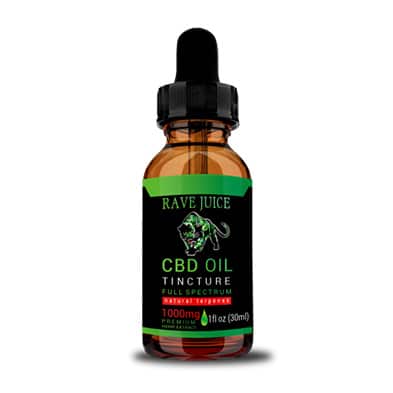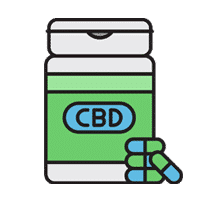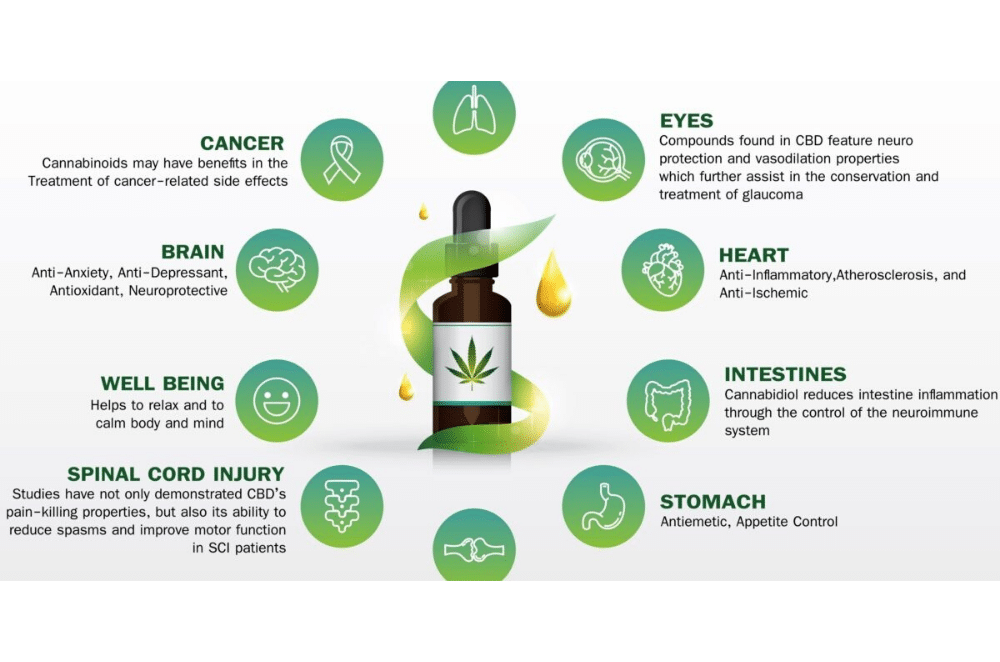Cannabidiol is one of the most common chemical compounds found in the resinous glands (trichomes) of the female cannabis plant. These chemical compounds are known as cannabinoids, or substrates that bind to special receptors on your cells. These cellular receptors constitute a broader endocannabinoid system.
The endocannabinoid system is a vast network of cellular receptor proteins with many functions. Some receptors are highly concentrated in the central nervous system. But, others are found throughout the body. They are in your skin, the digestive tract, and even in your reproductive organs.
The endocannabinoid system helps control everything from mood, cognition, movement, appetite, immune response, sleep, ovulation and sperm development. The human body produces compounds similar to those of the cannabis plant, called endocannabinoids. Molecules found on the herb are technically called phytocannabinoids. Like the most famous parent of CBD, tetrahydrocannabinol (THC), cannabidiol is one of the 85+ phytocannabinoids found in the marijuana plant.
Unlike THC, however, CBD is non-psychoactive.
Yes that’s right. CBD can not get you “high” or “stoned” in the way that THC does. While CBD still has an effect on your body, consuming CBD by itself is not going to send you on the brain adventure associated with THC. For decades, health professionals and the general public have neglected CBD because the psychoactive effects of marijuana have taken center stage.
Cannabidiol is just one of the 421 chemical compounds in the cannabis plant . It is the main medicinal component of cannabis – providing powerful therapeutic benefits against inflammation, pain, anxiety, muscle tension, stress, insomnia and more.
CBD owes most of its therapeutic benefits to its ability to interact with the endocannabinoid system. The main role of this system is to contribute to homeostasis (balance) throughout the body.
There are more than 66 different cannabinoids in the cannabis plant – each having a unique effect on the body.
The most abundant cannabinoid in the plant is usually CBD, followed by the main psychoactive component, THC (tetrahydrocannabinol). Other cannabinoids such as CBC (cannabichromene), CBG (cannabigerol) and CBN (cannabinol) make up the bulk of the remaining profile of cannabinoids.
How the CBD works
The CBD is a powerful medicinal compound indicated for symptomatic provide support for a long list of medical conditions and symptoms including: epilepsy , anxiety , chronic pain , the nausea, insomnia , stress , the multiple sclerosis , neurodegenerative disorders , and endocrine disorders .
How can such a simple compound present such a diverse list of medical benefits?
As mentioned earlier, the answer lies in CBD’s ability to interact with a body system involved in homeostasis – the SEC.
This means that CBD regulates the homeostatic system by controlling processes when they become hyperactive and stimulating them when they are deficient.
This is very different from other drugs or supplements – the effects of which usually have a specific direction, increasing or decreasing a given process in the body.
Let’s take a closer look at how the CBD works:
1. CBD increases levels of endocannabinoids (FAAH inhibitor)
CBD inhibits an enzyme called FAAH (“fatty acid amide hydrolase”). This enzyme is responsible for the degradation of endocannabinoids inside the cells.
CBD inhibits FAAH, stimulating our natural endocannabinoids, 2-AG and anandamide.
This is the main mechanism used by the CBD to promote the process of homeostasis. This is why CBD is thought to provide a “balancing effect” rather than forcing a reaction in the body in one direction or another.
2. CBD activates vanilloid receptors for pain
When you activate the vanilloid receptors for pain, the pain signals to the brain are blocked.
Vanilloid receptors have many responsibilities in the human body, including regulating the transmission of pain, inflammation and body temperature. Several other plants interact with these receptors to produce medicinal effects. Notably ginger, black pepper and chili peppers – all of which are well known for their analgesic effects.
CBD directly activates TRPV1 vanilloid receptors – thus reducing the intensity of pain signals sent to the brain and reducing overall inflammation throughout the body .
3. The CBD increases the activity of GABA
GABA (gamma-aminobutyric acid) is our main relaxing neurotransmitter. It acts as the brake pedal on the nervous system. When we start going too fast (mental excitement), GABA intervenes to slow us down.
GABA is important for sleep hygiene because it prepares the mind to fall asleep at night.
This neurotransmitter is also needed immediately after the stress. This reverses the process: slowing our heart rate, lowering blood pressure and allowing us to relax and recover.
When GABA does not work properly, we may become anxious and have trouble turning off the stress response or falling asleep – resulting in anxiety and insomnia.
GABA dysfunction can indirectly result in decreased immunity and digestive problems if the problem persists for long periods of time.
CBD is an allosteric modulator of GABA. This sophisticated term means that CBD does not directly activate the GABA receptor. It rather facilitates the binding of natural GABA to the receptors themselves.
This results in a feeling of increased relaxation and a decrease in hyperstimulation symptoms in the brain (anxiety, insomnia, PTSD, etc.).
This is also how many prescription anti-anxiety medications, such as benzodiazepines (Xanax, Valium or Klonopin, for example) work.
Unlike benzodiazepines, however, CBD does not create dependence. There are no withdrawal symptoms when you stop taking CBD even after several years of regular use.

What is cannabidiol for?
Now that we’ve explained what CBD is and how it works, let’s see what we can do with it – starting with the traditional uses of the cannabis plant.
Traditional Uses of CBD and Cannabis
For most of its history, humanity has used cannabis as medicine.
Cannabis use has remained relatively constant over the ages.
The first known references to hemp suggest that it was used in the treatment of pain and injury – which we now understand to be highly dependent on the plant’s CBD content.
It was not until the 1600s that cannabis became popular for treating psychological disorders such as depression, anxiety, cognitive decline and schizophrenia.
In the following centuries, cannabis became a popular health tonic for a long list of medical conditions and symptoms.
Common CBD types are; CBD Hemp flower, CBD Strength, Oil Type, Distillate Oil ( Full Spectrum Cbd oil) .
The most common traditional medicinal uses of cannabis:
Asthma
Epilepsy
Cancer
Skin infections
Inflammation
Schizophrenia
Dementia
Hepatic insufficiency
burns
Pain
In the early 1920s, cannabis was criminalized around the world for its psychoactive effects – putting an end to thousands of years of medical cannabis use.
Over the past 15 years, public interest has increased significantly in favor of cannabis as a source of drugs. Laws are being changed around the world. Countries such as Canada, Mexico and Uruguay have already legalized the plant for recreational and medicinal purposes.
Most countries now have specialized medical hemp programs. Extracts of CBD and cannabis with low THC content are now legally available in most countries of the world.
What research says about CBD
According to some, the CBD could cure just about anything – which obviously is not true. CBD is not a miracle cure and there are limits to what it can effectively treat.
It can be difficult to differentiate between exaggerated claims and reasonable CBD recommendations – especially because of the limited number of searches available.
Keep in mind that CBD was virtually unknown to the mainstream of science 20 years ago and that research is a slow process. It may take more than 10 years for research to catch up with public health trends.
Here are some of the medical uses of cannabis whose evidence is most obvious.
1. CBD and inflammation
CBD is a potent anti-inflammatory compound . In fact, its anti-inflammatory effects might explain why CBD is so effective in treating other health problems.
Chronic (long-term) inflammation is associated with many medical conditions, including Parkinson’s disease, Alzheimer’s disease, depression, arthritis, kidney disease, multiple sclerosis and more.
CBD targets the inflammatory process at several levels. It has been shown to inhibit many of the inflammatory markers that work together to cause inflammation in the body.
This overall anti-inflammatory effect makes CBD useful for a multitude of inflammation-related symptoms and provides long-term protective effects, particularly in cases of fatty liver, atherosclerosis, kidney disease and inflammatory bowel disease. the intestine.
2. CBD and anxiety
Anxiety includes many potential causes – nutritional deficiencies, traumatic events, chronic stress, medication side effects, recreational drug use, sleep deprivation or metabolic disorders, for example. This diversity of potential causes can make it difficult to treat anxiety.
CBD offers unique benefits in the treatment of anxiety, through its ability to improve GABA activity, improve sleep quality, reduce muscle tension and improve symptoms related to intestinal health and inflammation that may indirectly cause anxiety symptoms.
3. CBD and epilepsy
There is a great deal of research into the use of CBD for epilepsy – several large-scale clinical trials have already been published on the subject. Epilepsy is also the target of a future pharmaceutical antiepileptic drug based on CBD and THC called Sativex , as well as a similar drug, Epidiolex.
A 2016 cohort study of 74 patients with treatment-resistant epilepsy gave participants CBD-enriched hemp oil (CBD: THC ratio of 20: 1) for an average of 6 months. 89% of the participants in this study reported a reduction in the number of epileptic seizures.
In addition, the researchers noted other improvements in patient behavior, including alertness, communication, motor skills and sleep quality.
4. CBD and pain
Pain is another area in which a lot of research has been undertaken to verify the claims of CBD users.
This compound has some qualities that make it an attractive option for pain management over other options:
CBD does not create physical dependence
CBD is effective against different types of pain
CBD reduces pain through several independent mechanisms
A recent article by Ethan Russo – a medical cannabis researcher – presented a series of randomized clinical trials involving pharmaceutical preparations of CBD and THC extracts (Nabilone, Sativex and Marinol) and their effect on various types of pain.
The studies mentioned in the article indicate that CBD and THC can be used to relieve various forms of pain, including:
Neuropathic pain (nerve)
Pain of multiple sclerosis
Post herpetic neuralgia
Postoperative pain
Rheumatoid arthritis pain
Pain due to spinal cord injury
Pain due to cancer
Urinary tract pain associated with MS
5. CBD and multiple sclerosis
One of the leading cannabinoid-based pharmaceutical preparations (Sativex) has been approved as a treatment for multiple sclerosis by the FDA (the “US Food and Drug Administration”) in 2018. It has been proven that It improves the common side effects of MS, including muscle spasms. bladder dysfunction and nerve pain .
It has been shown that CBD, in particular, produces some preventive effects on MS – an autoimmune disease involving the destruction of myelin on the nerves by T lymphocytes. CBD prevents problematic T cells from migrating to microglia brain where it normally triggers inflammation and degeneration of myelin

When to avoid the CBD
CBD is not for everyone – here are some of the most important cases for which CBD should be avoided.
A) In case of severe depression
CBD is often suggested as a treatment for depression. Although it is of great interest for mild to moderate depression, it may not be suitable for people with severe chronic depression.
A major meta-analysis analyzed 57 separate studies on cannabis and depression to determine whether or not regular cannabis use was associated with depression. The study concluded that long-term cannabis use increases the risk of depression.
Anyone with severe depression should refrain from using CBD or other cannabis products without the supervision of a licensed health professional.
B) When taking benzodiazepine medications
Benzodiazepine medications such as Xanax are used to treat symptoms of anxiety and insomnia. They work by reinforcing the effects of the neurotransmitter GABA – which is one of the ways in which CBD provides its anxiolytic and sedative effects.
Drugs such as Xanax and Valium are significantly more effective than CBD and can have serious side effects or potential for dependence when combined with other drugs or supplements that work with GABA.
Therefore, it is strongly recommended to avoid using marijuana or CBD products in addition to the use of benzodiazepines.
C) In countries where the CBD is illegal
Unfortunately, the CBD is still considered illegal in some countries.
These laws are constantly changing, so you must find out for yourself in your country, region or territory to keep up to date with the laws of your place of residence.
We do not recommend the use of CBD in countries where the compound is illegal.
Here are some alternatives that you can explore if this is your case:
Kava ( Piper methysticum ) – for anxiety, pain and insomnia
Kratom ( Mitragyna speciosa ) – for pain, stress and anxiety
Turmeric ( Curcuma longa ) – for pain and inflammation
Incense ( Boswellia serrata ) – for pain, inflammation and arthritis
Ginkgo ( Ginkgo biloba ) – for neurodegeneration and heart disease / atherosclerosis
Bacopa ( Bacopa monieri ) – for neurodegeneration, neurological disorder.
Best selling CBD Products in miami Includes; CBD Hemp Flower, CBD Edibles, CBD Vape Catridges, Terpenes, Glass Pipes And Vaporizers
Common side effects of CBD
Although CBD is considered by the FDA to be a very safe supplement , some side effects may occur, particularly in sensitive people, or because of high doses.
Side effects of CBD may include:
Anxiety
Brain fog
Changes in appetite
Mood changes
Diarrhea
Dizziness
Drowsiness
Dry mouth
Tired
Nausea
Vomiting
What is more important than your health? Do you have any doubt about the product CBD to order? Do you want to know if the CBD can help you? Visit www.miamirave.com for more information
Conclusion
CBD is a relatively new health supplement that has a lot to offer for certain conditions or symptoms.
It is much more complex than many other dietary supplements – because of the complexity of the endocannabinoid system with which it interacts. This system is responsible for maintaining the balance of organs throughout the body (homeostasis). This gives the CBD a bidirectional effect and makes it very difficult for researchers to quantify its action.
Nevertheless, this supplement allows many uses. The hardest part is choosing the products to buy and determining the right dose.

